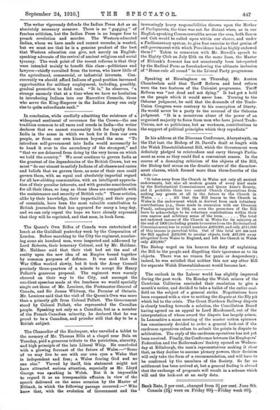The writer vigorously defends the Indian Press Act as an
absolutely necessary measure. There is no " gagging " of fearless criticism, but the Indian Press is no longer free to preach revolution and murder. The Western-educated Indian, whom we have made and cannot unmake, is wanted, but we must See that he is a genuine product of the best that Western education can give, not merely an English- speaking advocate of the revival of ancient religions and social tyranny. The weak point of the recent reforms is that they were intended mainly to benefit this class—politicians and lawyers—chiefly recruited from the towns, who know little of the agricultural, commercial, or industrial interests. Con- currently we should afford Indians of good position increased opportunities for military employment, including, possibly, gradual promotion to field rank. "It is," he observes, "a strange anomaly that at a time when we have no hesitation in introducing Indians into our Executive Councils, those who serve the King-Emperor in the Indian Army can only rise to quite subordinate rank."










































 Previous page
Previous page